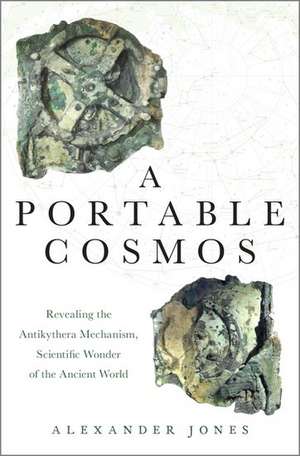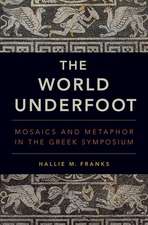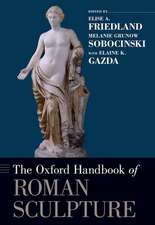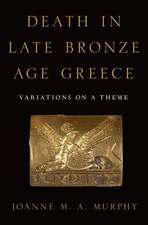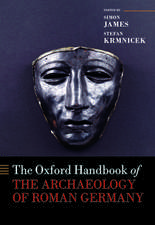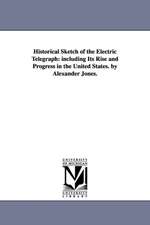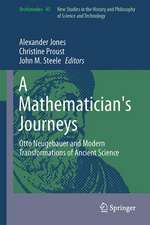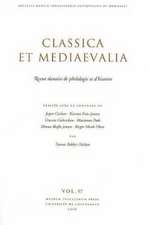A Portable Cosmos: Revealing the Antikythera Mechanism, Scientific Wonder of the Ancient World
Autor Alexander Jonesen Limba Engleză Hardback – 23 mar 2017
| Toate formatele și edițiile | Preț | Express |
|---|---|---|
| Paperback (1) | 123.60 lei 10-17 zile | |
| Oxford University Press – 8 aug 2019 | 123.60 lei 10-17 zile | |
| Hardback (1) | 321.49 lei 10-17 zile | |
| Oxford University Press – 23 mar 2017 | 321.49 lei 10-17 zile |
Preț: 321.49 lei
Preț vechi: 390.52 lei
-18% Nou
Puncte Express: 482
Preț estimativ în valută:
61.52€ • 64.23$ • 50.91£
61.52€ • 64.23$ • 50.91£
Carte disponibilă
Livrare economică 03-10 martie
Preluare comenzi: 021 569.72.76
Specificații
ISBN-13: 9780199739349
ISBN-10: 019973934X
Pagini: 312
Ilustrații: 41 b/w halftones; 41 b/w line drawings
Dimensiuni: 168 x 236 x 23 mm
Greutate: 0.62 kg
Editura: Oxford University Press
Colecția OUP USA
Locul publicării:New York, United States
ISBN-10: 019973934X
Pagini: 312
Ilustrații: 41 b/w halftones; 41 b/w line drawings
Dimensiuni: 168 x 236 x 23 mm
Greutate: 0.62 kg
Editura: Oxford University Press
Colecția OUP USA
Locul publicării:New York, United States
Recenzii
The book is a triumph at several levels, as an account of high-grade detective work, as an exposition of ancient astronomical ideas, and as a disquisition on where those ideas fitted into the society that produced them. ... This is recommended reading for anyone interested in ancient astronomy.
This book will be invaluable to those engaged in the study of the science of the ancient Greeks and Romans. Endnotes and references will assist individuals who wish to delve into further research. The presented black-and-white photographs and drawings are essential to understanding the work's subject matter. ... Summing Up: Recommended. Graduate students, faculty, and professionals.
[Jones] presents a very readable account of the Mechanism, and the consensus of what it was used for... [An] excellent 'User Manual'.
Jones has, in short, produced a superb guide to this dazzling embodiment of ancient astronomical knowledge and mechanical technology. Detailed enough that even scholars of ancient science will learn much, yet readable enough that undergraduate students will find it approachable (I myself have tested out both audiences), this book ends the long wait for a thorough, reliable, and accessible guide to the Antikythera Mechanism.
This is a remarkable book about a remarkable device. After reading A Portable Cosmos, the Antikythera Mechanism seems a little less different and strange, a little less impossible but no less of an ancient wonder. In clear and lucid prose, Alexander Jones has successfully integrated all the necessary literary, archaeological, and forensic evidence relevant to the Mechanism. The result is a detailed, thorough, and perceptive analysis which will surely stand as the definitive handbook on the Antikythera Mechanism for some time to come.
[Jones] provides just enough general context for readers to understand the astronomical background, while being just technical enough for them to feel that they have a grasp of the object's complexity.
Convincing.
As riveting as any thriller or criminal investigation... Jones's text... is precise but calm, elegant and with a certain charm... We need more books like this.
Jones takes the reader on a journey through the various years of research into the mechanism's background, as well as into the device itself, awarding a glimpse beneath the corroded surface and into the interior gears and cogs.
Jones' book is written in such a way that makes it profitable reading for a wide range of readers, from the specialists on the Mechanism to those who have never heard of it.
His virtue as an author is an exhaustive knowledge of his subject ... refreshingly candid
A nimble, comprehensive survey of a wondrous machine
A Portable Cosmos is set to become the definitive history of the Antikythera Mechanism, and will be of great value to specialists, as well as students and those interested in ancient Greco-Roman science and technology.
Jones's text, too, is precise but calm, elegant and with a certain charm. His learning is broad: here's Ptolemy, here are gear ratios, here's Cicero and Galen, Babylonians, planets, lunar months, Glauco, epicyclics and the 'Spindle of Necessity'. And it is not just the cosmos that is demonstrated, but the vast difference, and astonishing similarity, between us and our ancestors. So out of the history of science comes a sense of our humanity and the ancient desire to comprehend. God knows, it's timely, in the shrivelled cosmos we are building. We need more books like this. And probably more sponge-divers, too.
A Portable Cosmos is both an excellent focussed case study of an individual object and a comprehensive broader treatment of the relevant aspects of ancient science and technology. It is beautifully and thoughtfully illustrated, with numerous diagrams and photographs placed strategically throughout, not just of the mechanism but of various other relevant ancient objects such as calendar and other almanac-style parapegma inscriptions, manuscripts, astrolabes etc. I shall definitely be adding it to the syllabi of my 'Nature and the Natural World in Antiquity' and 'Ancient Technology' courses, and I recommend that other instructors do the same.
This book will be invaluable to those engaged in the study of the science of the ancient Greeks and Romans. Endnotes and references will assist individuals who wish to delve into further research. The presented black-and-white photographs and drawings are essential to understanding the work's subject matter. ... Summing Up: Recommended. Graduate students, faculty, and professionals.
[Jones] presents a very readable account of the Mechanism, and the consensus of what it was used for... [An] excellent 'User Manual'.
Jones has, in short, produced a superb guide to this dazzling embodiment of ancient astronomical knowledge and mechanical technology. Detailed enough that even scholars of ancient science will learn much, yet readable enough that undergraduate students will find it approachable (I myself have tested out both audiences), this book ends the long wait for a thorough, reliable, and accessible guide to the Antikythera Mechanism.
This is a remarkable book about a remarkable device. After reading A Portable Cosmos, the Antikythera Mechanism seems a little less different and strange, a little less impossible but no less of an ancient wonder. In clear and lucid prose, Alexander Jones has successfully integrated all the necessary literary, archaeological, and forensic evidence relevant to the Mechanism. The result is a detailed, thorough, and perceptive analysis which will surely stand as the definitive handbook on the Antikythera Mechanism for some time to come.
[Jones] provides just enough general context for readers to understand the astronomical background, while being just technical enough for them to feel that they have a grasp of the object's complexity.
Convincing.
As riveting as any thriller or criminal investigation... Jones's text... is precise but calm, elegant and with a certain charm... We need more books like this.
Jones takes the reader on a journey through the various years of research into the mechanism's background, as well as into the device itself, awarding a glimpse beneath the corroded surface and into the interior gears and cogs.
Jones' book is written in such a way that makes it profitable reading for a wide range of readers, from the specialists on the Mechanism to those who have never heard of it.
His virtue as an author is an exhaustive knowledge of his subject ... refreshingly candid
A nimble, comprehensive survey of a wondrous machine
A Portable Cosmos is set to become the definitive history of the Antikythera Mechanism, and will be of great value to specialists, as well as students and those interested in ancient Greco-Roman science and technology.
Jones's text, too, is precise but calm, elegant and with a certain charm. His learning is broad: here's Ptolemy, here are gear ratios, here's Cicero and Galen, Babylonians, planets, lunar months, Glauco, epicyclics and the 'Spindle of Necessity'. And it is not just the cosmos that is demonstrated, but the vast difference, and astonishing similarity, between us and our ancestors. So out of the history of science comes a sense of our humanity and the ancient desire to comprehend. God knows, it's timely, in the shrivelled cosmos we are building. We need more books like this. And probably more sponge-divers, too.
A Portable Cosmos is both an excellent focussed case study of an individual object and a comprehensive broader treatment of the relevant aspects of ancient science and technology. It is beautifully and thoughtfully illustrated, with numerous diagrams and photographs placed strategically throughout, not just of the mechanism but of various other relevant ancient objects such as calendar and other almanac-style parapegma inscriptions, manuscripts, astrolabes etc. I shall definitely be adding it to the syllabi of my 'Nature and the Natural World in Antiquity' and 'Ancient Technology' courses, and I recommend that other instructors do the same.
Notă biografică
Alexander Jones is a classicist and historian of science whose interests center on astronomy and related scientific traditions in the Greco-Roman world and the ancient Near East. Before joining the Institute for the Study of the Ancient World in 2008, he was for many years on the faculty of the Department of Classics and the Institute for the History and Philosophy of Science and Technology at the University of Toronto.
